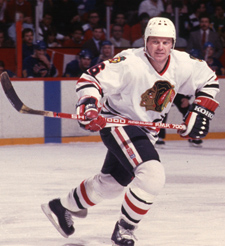VanIslander
A 19-year ATDer on HfBoards
center Ron Sutter, the Selke finalist defensive pivot who centered the Flyers second line for most of a decade, including two trips to the Stanley Cup Finals. On the first cup run he scored 12 playoff points including a team-tying high four even strength goals despite having a shadowing defensive role primarily. He was injured at the start of their next cup run but had eight points by Game 7 of the Stanley Cup Finals, his main job was defending against opposing top centers, like Gretzky and Lemieux. The highest drafted Sutter brother ever had a career plagued by injuries, due in part to his all-out style, but he played through them to a 1000+ NHL game career, though his eight years on Philly are clearly his greatest. He captained the Flyers for two seasons, including a Game 6 Conference Finals run, before being traded in the deal to bring Brind'amour to Philly.



... tenacity, defensive excellence and natural leadership ability
http://flyers.nhl.com/club/page.htm?id=73298Sutter was a key member of the great Flyers teams of the 80's, and although he did not put up the offensive numbers as some of his teammates, his role was all that much greater to the team.
Sutter personified the stigma of a player that opponents most hated to play against. His tenacity and passion on the ice earned him the respect of every person in the locker room.
He was your go-to-guy whose enormous task was always to shut down the star of the other team – which he most often accomplished.
Rick Tocchet said:He’s your ultimate team guy, who thought first about team stats than his personal stats. He was always willing to help teammates not just on the ice, but go that extra mile off the ice as well.
New York Times said:FLYERS' SUTTER READY TO FACE GRETZKY
The list has grown more formidable as the playoffs have progressed. First there was Bryan Trottier, then Peter Stastny and now Wayne Gretzky will be looking Ron Sutter in the eye.

http://broadstreetbullies.blogspot.kr/2006/05/ron-sutter.htmlRon was the highest drafted Sutter ever, going 4th overall to the Philadelphia Flyers in 1982 despite missing part of his final year of junior with a broken ankle.
Ron was never expected to put up great offensive numbers, although he would put up decent numbers during his Philly days. Instead, he was the guy who would try to shutdown the opposition's top player such as Wayne Gretzky or Mario Lemieux. Sutter's defensive excellence was recognized around the league. In 1985-86 he finished as runner up to Chicago's Troy Murray in league voting as the best defensive forward.
Because of his tenacity, defensive excellence and natural leadership ability, Ron was instantly compared to Bobby Clarke - the Flyers Legend. Those comparisons were ultimately a little lofty as Ron's game lacked offensive polish, although Ron was certainly a key member of the Flyers during the 1980s.
The Flyers had some great years in the 1980s, and twice made the Stanley Cup finals, only to fall short to the powerhouse Edmonton Oilers led by Wayne Gretzky and Mark Messier. The Flyers had the likes of Tim Kerr, Mark Howe and later Ron Hextall in their lineup. Those were some good exciting times to be a Flyers fan.
The 1987 Stanley Cup finals in particular are most memorable. Considered by many as one of the greatest championship series ever played, the Flyers pushed Gretzky's Oilers to the limit. The series took a full seven games to complete.
Had Ron Sutter been fully healthy, the Flyers might have had just enough to knock off the dynastic Oilers. Ron missed half of the season and the start of the playoffs with a stress fracture in his lower back. Despite the debilitating injury, Sutter came back to for the playoffs and played through immense pain.
Pain was nothing new to any of the Sutters. They're all-out style of play led to many injuries. In addition to the back and ankle injuries already mentioned, some of the more serious injuries Ron had to battle through in his career include broken ribs, pulled hip flexor, right knee ligament damage, abdominal pulls, seperated shoulders and the always troublesome groin pull.
Of course none of these injuries altered the way Ron would play, which likely made it tough for Mother and Father Sutter to watch hockey.
By 1988 Ron began enjoying his best years offensively. The Flyers were starting their downward cycle and as a result there was more playing time for Ron, which meant more offensive opportunity. He played often on a line with Brian Propp and Rick Tocchet. By December Ron became captain of the team, taking over from Dave Poulin. It was a great compliment to Ron, as he epitomized what Flyers hockey is all about.
By the early 1990s the Flyers were going through their leanest years since they were an expansion team. The house was cleaned including Ron, who was traded to St. Louis in the deal that brought Rod Brind'Amour to Philadelphia.
Ron played well in St. Louis until 1993-94 when he was traded to Quebec. His stay there was brief, as was his next stop. By 1996 he found a home with the San Jose Sharks for 4 years, but was strictly a 4th liner. In 2000-01 he signed with the Flames by mid season. He was clearly not the player that he used to be, but he was a good influence in the dressing room and a good faceoff man.
Ron Sutter played 1093 games, registering 205 goals, 328 assists and 533 points, not to mention 1352 PIM.




















